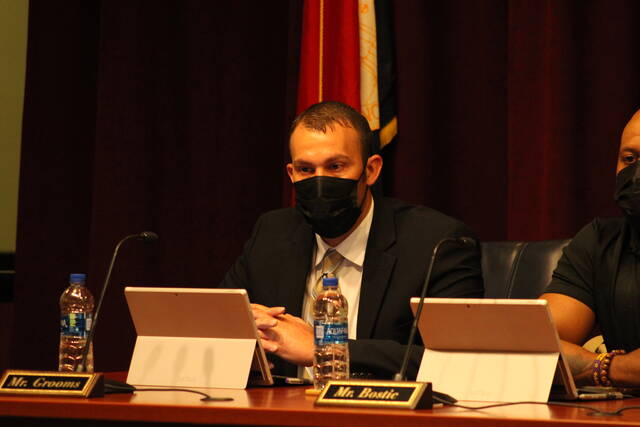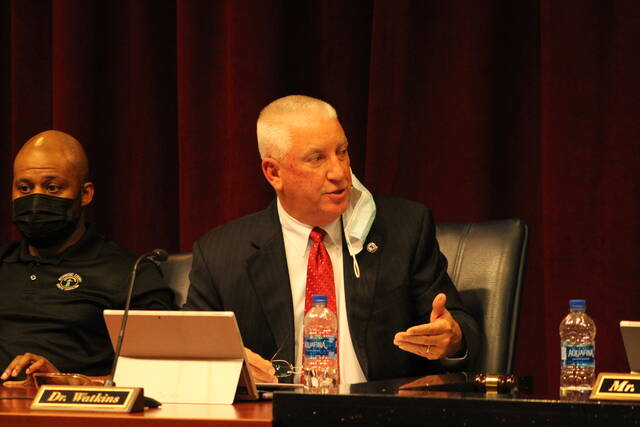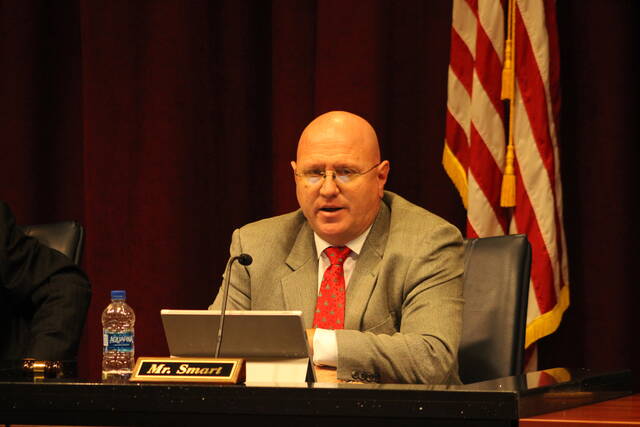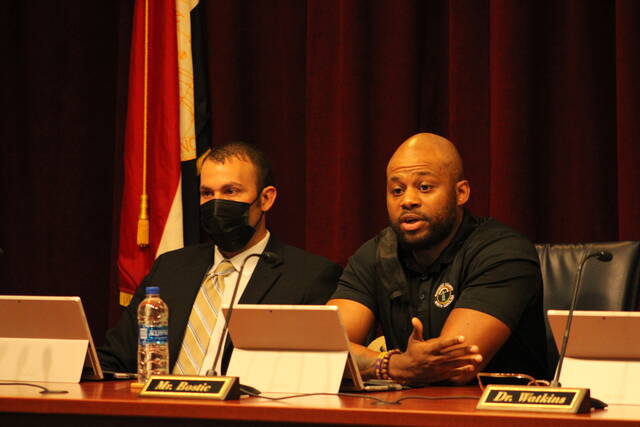
Commissioner Andy Grooms argues that the current public comment policy is too strict and discourages the public from engaging with the Board.
Gavin Stone | Daily Journal
ROCKINGHAM — The Richmond County Board of Commissioners on Tuesday agreed to have county staff review the legalities associated with amending the county’s public comment policy to be less restrictive on what can be discussed and to extend the amount of time the public has to sign up, in preparation for a vote at the next meeting.
The current public comment policy was initially adopted in October 1997 and has been amended three times since, the most recent being in February 2011. Commissioner Andy Grooms presented his suggestion for opening the meetings up to more public discussion and took issue with two key aspects of the policy: the public not being allowed to speak on matters that appear on the current meeting’s agenda and the requirement that those who wish to speak sign up by 5 p.m. on the Friday before each Tuesday meeting.
Grooms wants the policy to allow members of the public to speak about current agenda items and expand the time that potential speakers have to sign up to the first full county day of work prior to the meeting, which in normal circumstances would be the Monday before the Tuesday meeting.
The agenda for each Board of Commissioners meeting is sent out on the Friday before, typically late in the day. For 2021, with the exception of the Jan. 5 meeting in which the prior Friday was New Year’s Day and the Sept. 13 meeting which was rescheduled, each agenda was made public in the afternoon on the Friday before the meeting, leaving the public less than 5 hours to see the agenda and determine whether they want to sign up to speak. Six of those agendas came out after 4 p.m., and one (for the March meeting) was released at 5:05 p.m.
“Our current policy, the way it looks to me, we’re almost discouraging citizens of this county from coming here and speaking on agenda items,” Grooms said.
Having a speaker during the open forum for public comment at Board of Commissioners meetings is very rare. County Clerk Dena Cook did not respond to a request for a record of all of those who had signed up to speak over the last three years. In this reporter’s memory, a large group accompanied Hoffman Town Council members to speak to the Board several years ago when they were angry that the county had stopped its annual contribution to Hoffman Parks and Recreation. Additionally, one resident came to the Board on a semi-regular basis several years ago with concerns about construction happening adjacent to her property.
Grooms did not raise concern about other aspects of the policy, which further states that public comment time will be 30 minutes with a max of six speakers who have five minutes each, limits groups addressing the board to 10-minute presentations with no more than two speakers, requires comments to be about “items which have an impact upon the community” and holds speakers accountable for slanderous statements, and states that there can be no public debate nor audience response to public comments unless the Board requests it.
County leadership has explained previously that the current policy was put in place after speakers became unruly during a particular meeting, and after complaints that the meetings were going on for several hours due to the prolonged discussions that would be had.
“I think the good [that would come from changing the policy] outweighs the bad, I don’t think we’re going to have a tremendous amount of citizens coming in here trying to raise hell every single meeting,” Grooms said. “I don’t think either the Board or the Richmond County government should be standing in the way of citizens speaking their mind even if it is five seconds before a vote.”
The commissioners voted in favor of Vice Chairman Justin Dawkins’s motion to have county staff research the specifics of this policy change in order to present them with an agenda item to vote on at the next meeting. Each of the other commissioners seemed to be in agreement with Grooms, with Commissioner Bostic expressing confidence that the Board and Chairman Jeff Smart could maintain a professional environment.
“Everyone in the county should have an opportunity to come and state their case on, really, whatever they want to state their case about,” Bostic said. “I think we can still conduct these meetings in the most professional way and also allow the citizens to come in and truly have a relationship with government. I think it was Ross Perot that said, Government should come from its people, not at them.’ So if we really believe that then we should be able to open up the public forum and allow people to come in and state their piece on the communities that they live in.”
Commissioner Rick Watkins asked to clarify whether Dawkins’s motion was to have a vote county staff’s final version of the policy that would be strictly limited to what Grooms put forward, or whether the commissioners could consider the findings staff may come up with which may differ from these ideas but could make the policy more legally sound. Dawkins and Grooms agreed that the motion could allow for this flexibility.
“I think it’s important that we make sure from a legal perspective that this is a solid policy that we can move forward with for years to come that will serve the Board well and serve the citizens well moving forward,” Watkins said. “I just want to make sure that we get it right.”
To support the Daily Journal, subscribe by calling 910-997-3111 or visiting https://www.yourdailyjournal.com/subscribe.
Reach Gavin Stone at 910-817-2673 or [email protected].




![Commissioners request Commerce to prioritize getting Speedway “race-ready”
“The obvious goal… [is] getting NASCAR back,” Chairman Jeff Smart concluded. “Not only for financial reasons, but for quality of life. Bring it back. Let’s bring racing back to the rock. That’s what we are doing this for.”
Matthew Sasser | Daily Journal](https://s24507.pcdn.co/wp-content/uploads/2023/12/130203247_web1_IMG_5722-218x150.jpg)

